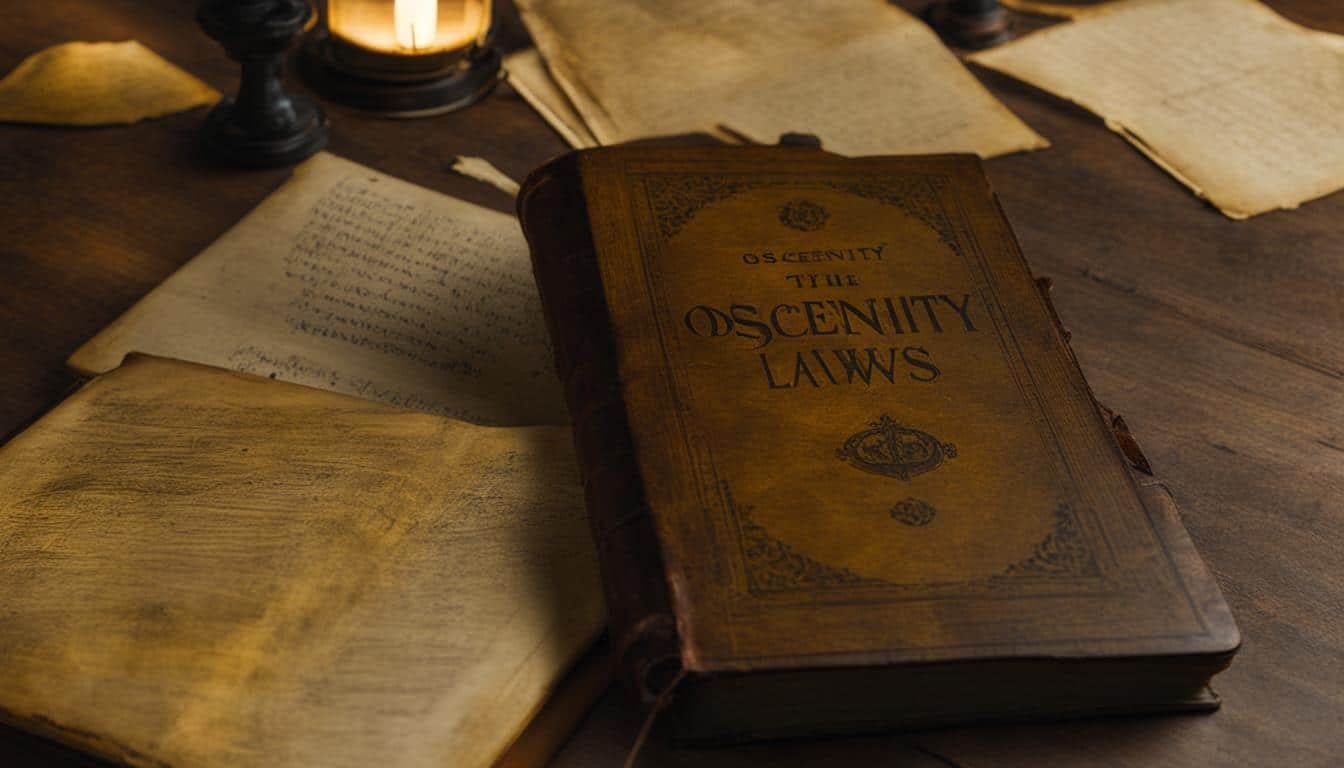Welcome to our comprehensive guide on the legal interpretation of obscene literature in the United States. In this article, we will explore the various federal statutes that govern the interpretation of obscene literature and the consequences of violating these laws. We will also delve into the constitutional principles that shape the regulation of obscenity and the stance of the Catholic Church on obscene literature. So, whether you’re curious about the legal framework around obscene literature or want to understand the Church’s perspective, you’ve come to the right place.
Key Takeaways:
- The legal interpretation of obscene literature in the United States is governed by federal statutes.
- The Miller test is a three-pronged test used by the U.S. Supreme Court to determine whether matter is obscene.
- Violation of federal obscenity laws can result in fines, imprisonment, and the requirement to register as a sex offender.
- Federal laws prohibit various activities related to obscenity, such as possession with the intent to distribute and the importation of obscene materials.
- Regulation of obscene literature must adhere to constitutional principles, including the protection of freedom of speech and the press.
- The Catholic Church prohibits the reading of obscene literature to protect the integrity of its members and preserve Christian morals.
Federal Laws Prohibiting Obscenity
The United States has established federal laws that prohibit various activities relating to obscenity. These laws serve to regulate the possession, distribution, and transportation of obscene materials, as well as the engagement in the business of selling or transferring such matter. It is also illegal to import or transport obscene materials across state borders, as well as to distribute obscene material through broadcasting, cable, or subscription television. Violation of these federal obscenity laws can result in fines and imprisonment.
Specific provisions within these laws address the issue of obscenity involving minors. There are laws that prohibit the transfer of obscene matter to minors and the production or possession of obscene visual representations depicting the sexual abuse of children. These laws aim to protect minors from exposure to explicit and harmful material and hold individuals accountable for engaging in such activities.
It is important to note that federal laws regarding obscenity are in place to maintain public order, protect vulnerable individuals, and ensure the ethical standards of society. By prohibiting the possession, distribution, and transportation of obscene materials, the government aims to prevent the potential negative impact on individuals and communities.
Federal Laws Prohibiting Obscenity
| Laws | Description |
|---|---|
| Possession with intent to sell or distribute obscene matter | Prohibits the possession of obscene materials with the intention to sell or distribute them. |
| Transportation of obscene matters for sale or distribution | Prohibits the transportation of obscene materials for the purpose of sale or distribution. |
| Engaging in the business of selling or transferring obscene matter | Prohibits engaging in the business of selling or transferring obscene materials. |
| Importation or transportation of obscene matter | Prohibits the importation or transportation of obscene materials across state borders. |
| Distribution of obscene material through broadcasting, cable or subscription television | Prohibits the distribution of obscene material through broadcasting, cable, or subscription television. |
| Obscenity involving minors | Includes laws that specifically address obscenity involving minors, such as the transfer of obscene matter to minors and the production or possession of obscene visual representations depicting the sexual abuse of children. |
Constitutional Principles and Obscenity
The regulation of obscene literature in the United States is guided by constitutional principles that balance the protection of freedom of speech with the need to prevent harm and maintain societal standards. The power of Congress to regulate or ban pornography is derived from its authority to regulate commerce and establish post offices and post roads. However, any restrictions on pornography must adhere to the First Amendment, which safeguards freedom of speech and the press.
The U.S. Supreme Court has developed the Miller test to determine whether a work is obscene. This three-part test assesses whether the material appeals to prurient interests, is patently offensive, and lacks serious value in terms of literary, artistic, political, or scientific merit. Unlike other forms of speech, the Court has recognized that obscenity can be prohibited based on its content.
“The Miller test serves as a benchmark for courts to evaluate whether a particular work falls within the category of obscene. Through this test, the Court aims to strike a balance between protecting First Amendment rights and preventing the distribution of sexually explicit material that lacks redeeming value.”
The Supreme Court has also acknowledged that certain regulations, such as zoning and licensing requirements, may be imposed on sexually oriented businesses to prevent secondary effects such as crime. These measures aim to limit the concentration of adult establishments in certain areas and protect the community’s well-being. Overall, while the Constitution grants some authority to regulate obscene literature, it sets clear boundaries to ensure the preservation of free speech and the prevention of harm.
The Miller Test for Obscenity
The Miller test, established by the Supreme Court, consists of three prongs:
- The material must appeal to prurient interests, meaning it has a dominant tendency to arouse an unhealthy or morbid interest in sexually explicit content.
- The material must be patently offensive, such that it violates contemporary community standards relating to sexual matters.
- The material must lack serious literary, artistic, political, or scientific value. It must be devoid of any redeeming qualities that would render it socially valuable.
| Prong | Explanation |
|---|---|
| 1 | The material must appeal to prurient interests, meaning it has a dominant tendency to arouse an unhealthy or morbid interest in sexually explicit content. |
| 2 | The material must be patently offensive, such that it violates contemporary community standards relating to sexual matters. |
| 3 | The material must lack serious literary, artistic, political, or scientific value. It must be devoid of any redeeming qualities that would render it socially valuable. |
The Church and Obscene Literature
The Catholic Church has always been concerned about the impact of obscene literature on moral behavior. The Church recognizes the dangers that obscene literature poses in inciting illicit sexual thoughts and behaviors. It acknowledges the power of literature to shape individuals’ thoughts and behavior, and understands the influence that authors have on readers.
The Church’s legislation against obscene literature is based on its mission to preserve Christian morals and protect the integrity of its members. It prohibits the reading of obscene literature in order to prevent moral harm and ensure the preservation of its members’ moral behavior. While the natural law only requires individuals to avoid reading material that is dangerous to their own morality, the Church’s legislation applies to all Catholics and aims to protect morality on a broader scale.
The Church’s stance on obscene literature is rooted in its commitment to promoting virtuous living and upholding Christian principles. By discouraging the consumption of obscene material, the Church seeks to safeguard the spiritual well-being of its followers and encourage them to pursue a path of righteousness. Through its teachings and guidance, the Church aims to cultivate a society that values purity, decency, and respect for one another.
Source Links
- https://www.justice.gov/criminal/criminal-ceos/citizens-guide-us-federal-law-obscenity
- https://www.everycrsreport.com/reports/95-804.html
- https://scholarship.law.stjohns.edu/cgi/viewcontent.cgi?article=1520&context=tcl







